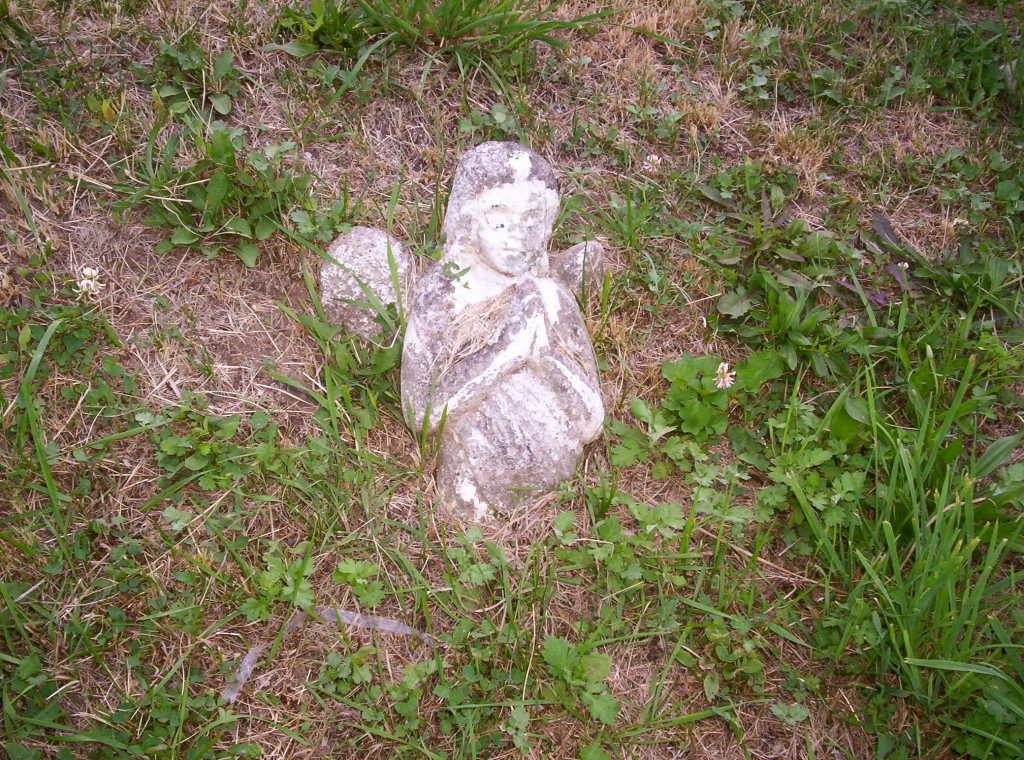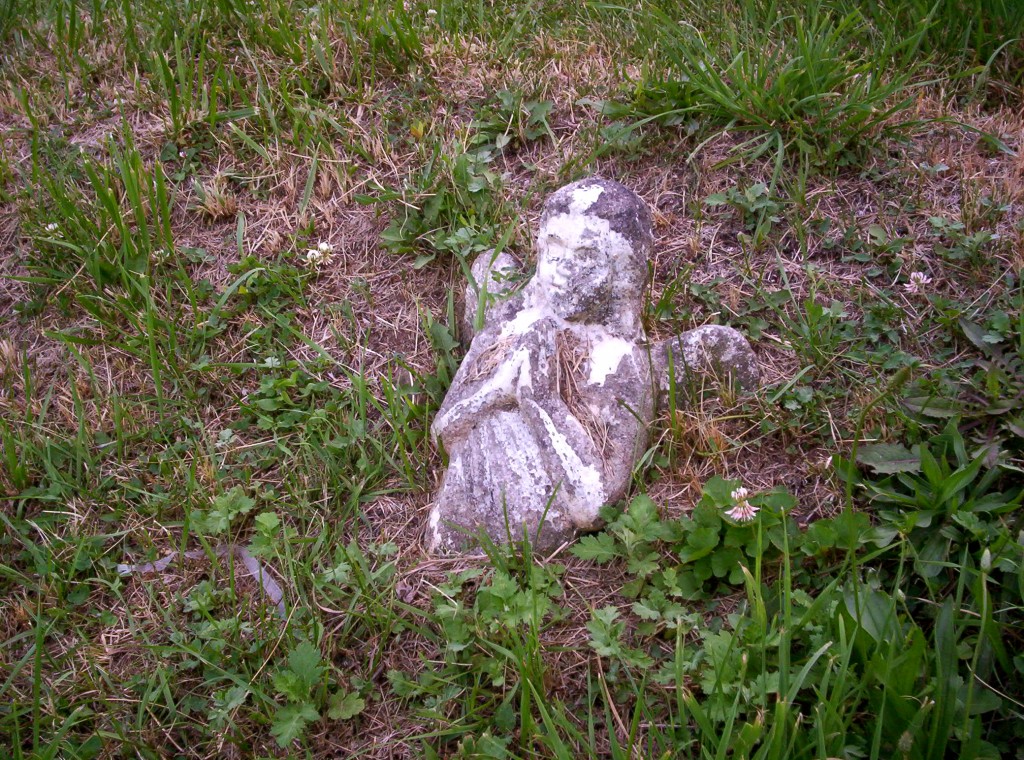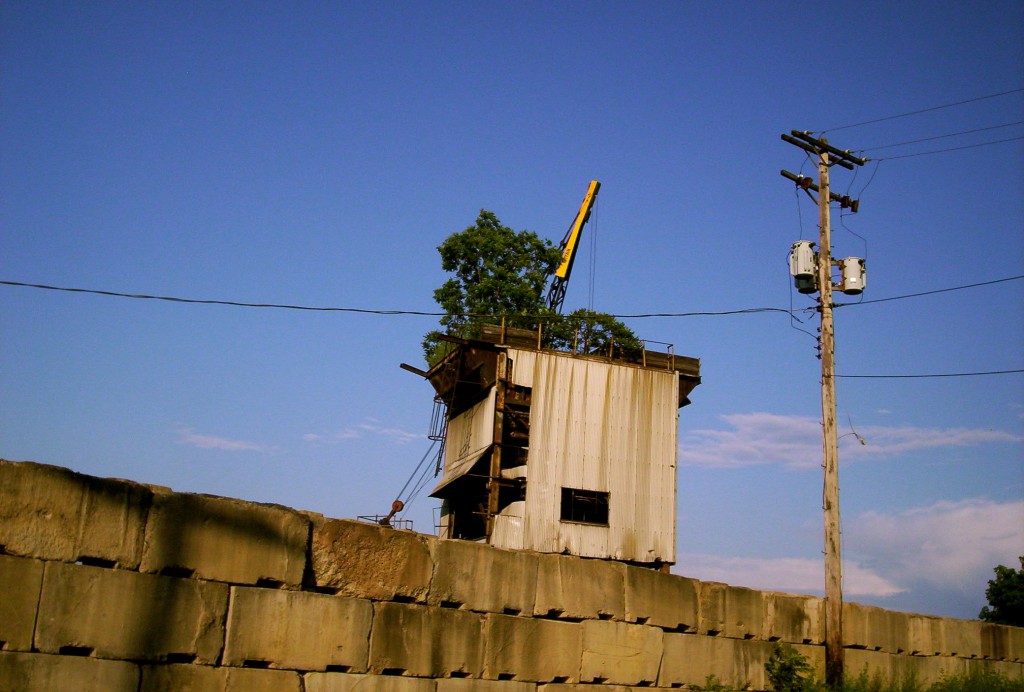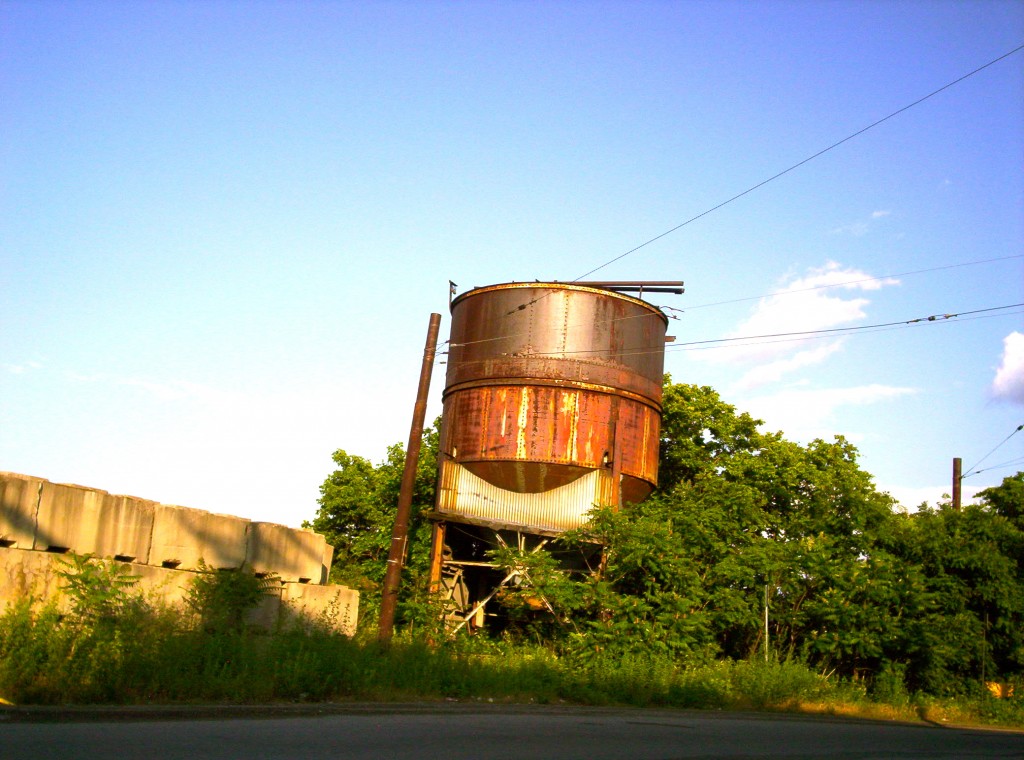More often than not, Fridays are good and interesting days at Greenstar. This past one, there were lots of problems with the machines — in an eight-hour shift, I think the belts were running no more than twenty or twenty-five minutes. So the company lost money, but we had the adventures!
Before I forget: while the line was running, I got quite a start from a baby doll that came down the belt. I was leaning forward to deal with some cardboard to my right, facing away from the chute. As I started to turn and straighten, my gaze swung to the left, and here was this nearly life-sized baby lying on its side, coming down the belt head-first, its eyes mere inches from mine. I jumped backward, for sure! Ralph scooped it up and initially threw it away, then saw what it was and retrieved it. It’s one of those uncertain objects that we’ll consider for awhile before we (probably) throw it away. Or someone else will. Punkin usually purges our artifacts rack. So for shock value, the baby doll joins the ranks of the rubber snake and the plastic bag that had weirdly-weighted half-full water bottles inside it and thus seemed to tremble and jiggle, as if something were alive inside it.
So the machines were down from the outset, and we started the day with a safety meeting that terrorized us with graphic, true stories about guys who have been killed at recycling plants. I won’t repeat the stories here — I’ll be lucky if I don’t have nightmares, and I don’t want to pass them along to you. But lest you worry about me, I don’t work around the machines that are potentially deadly.
We started the standard cleanup, and Gizmo gave me a great job. He wanted me to use the blower, which I’d never used before. It hangs from your shoulder by a rope, and its barrel directs a powerful jet of air against the ground. Swinging the barrel from side to side, steadily advancing, you can practically remove a layer of topsoil, along with all the loose and even embedded trash, and you can herd it right where you want it. I quickly figured out how to use it surgically, lifting the barrel when I didn’t want to apply the air stream to the ground. What a miracle of technology — to hold the power of a gale in your hands, and to control precisely where it blows! I imagine it was something like having an M-16, except that my work was peaceful. I used it to scour clean the roadway behind the trailer, and Gizmo sent guys to help me scoop the piles into wheelbarrows.
Later, as I was working with some guys to load trash from the steel “caves” into more wheelbarrows, Spider came by and said, “Hey, Fred, what did you do with that leaf-blower?”
Leaf-blower?! That awesome piece of military hardware was a leaf-blower? Leaf-blowers are used by beefy men in the suburbs. I wear a hardhat. Can’t we call what I used an Air Cannon, or a Hellcat, or a Goliath, or an MC-37, or a sixteen-millimeter, or a Sandstorm, or a Thunder Rake, or a Thumper . . .? There’s got to be a better term for it than “leaf-blower.” We don’t have leaves at Greenstar. We have rocks, dirt, grit, mud, and garbage. The leaves are in Frick Park, when I’m writing.
The low point of the day was when the floor boss enlisted me to dump huge cardboard boxes of plastic buckets onto the junk belt. Yum-Yum and another temp helped me. These buckets were from some sort of restaurant and had contained a mixture of honey and garlic. They’d sat somewhere for a while, presumably in the hot sun. Honestly, it’s the worst smell I can recall ever having encountered. It beats out the evil bat guano of Ohsawa Cave between Tagami and Muramatsu in Niigata, which had been the previously reigning champion.
We had a fire drill in the morning: everyone had to go out of the building and rendezvous at the red dot on the back fence. Then for a while, Gizmo sent me, Ralph, and Jeff to pick garbage out of said back fence.
At lunchtime, because of continuing mechanical difficulties, they sent most of the guys home. But our Greater Boss implied that he would like a few of us to stay and help if we wanted to. Ralph looked at me and said, “You wanna stay?” It’s all his fault. I know my days of working with Ralph are limited; sooner or later, one or the other of us is going to go to greener pastures; and I don’t want to miss a minute of this curiously-balanced summer while it’s here — he’s a great work-partner. So I said to the Greater Boss, “How can I help? Where do you want me to go?” He said, “Probably down in the hole, shoveling.”
Um . . . on the way out of the building, I asked Ralph, “What’s the hole?” He said, “I have no idea.” It sounded pretty ominous.
I was about to find out. I ate lunch at the usual time, while Gizmo and his crew (including Ralph) dragged compacted junk out from under the silent behemoth. A light rain was falling, so I put my wool gloves underneath my rubber gloves to keep them drier. (They were still damp from sweat, but that’s how it goes.) Then Ralph got to microwave his Hungry Man frozen dinner, and I got to experience the hole. It’s a metal trench, perhaps three feet wide by eight feet long, and shoulder deep, right before the knees of the residential Engine. Gizmo sent me into it, and I found myself standing in water on an uneven, shifting surface of trash. He told me how to put my feet against the walls, where the garbage was a little higher and drier — but I’m glad my steel-toed shoes are the waterproof kind. I shoveled out the cans, bottles, and muck, throwing them up onto the ground, then dragging them into the trash bay. Gizmo was even more laudatory of my work than before. “You are the man!” he kept repeating. He said he always wants me on his work crew. Give me a precarious high place or a subterranean place, and I’m happy.
So we carted the stuff from the can-and-bottle belt to the mud bay so that the welders could weld the beast back together again. Spider managed to get us paid for a full eight hours for volunteering to stay (the normal day is counted as 7.5 hours — today, they paid us for lunch!).
For the last hour-plus, Spider and Gizmo turned Ralph and me loose to go where we wanted and clean up whatever needed it. “Just keep busy,” they said. I was touched by that level of trust. They know we’re there to work, and that they don’t have to be looking over our shoulders. We swept floors, knocked down scraps from overhead, and hauled load after load to the Great Pile. My Man the Rat put in two more appearances. Once, for all the world it looked as if he started across the yard, saw the Greater Boss, and made a panicked U-turn. Soon enough, it was time to sign out. I drove Gizmo down into the Rocks so he could catch his bus, and we talked about our individual weekend plans.
And there you have it — another Friday at Greenstar. That evening my friend R. commented that I’m looking pretty macho these days — all brown from the sun, and with beard stubble. You know it!




















